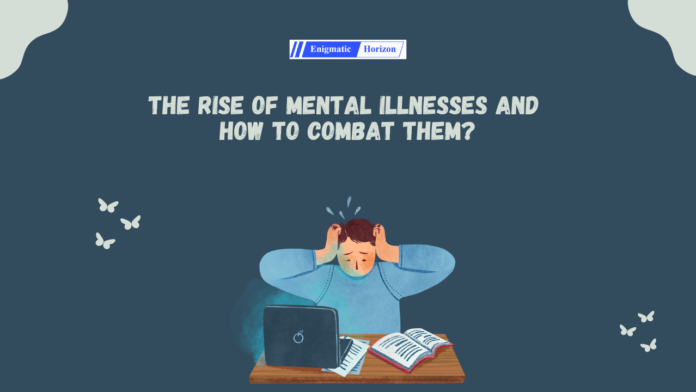Anurag Gade
Over the past ten years, medical science has changed a lot, which has led to amazing progress in health and wellness. All this has led to mental disorders being treated just as effectively as physical ones.
There are both medicinal as well as therapeutic options available when it comes to treating mental illnesses. However, the majority of the experts suggest that medicinal treatments, in combination with psychotherapy have proven to be more effective than sticking to only a single method of treatment.
Given the various kinds of mental illnesses, each tends to react differently to the mode of treatment preferred. This makes choosing the right treatment tougher and more complicated.
Medications
While therapy is the primary recommended source of treatment for mental health, modern-day medications such as different types of drugs are slowly being prescribed to tackle issues such as depression, anxiety, and other conditions.
Drugs and medications are generally prescribed to alleviate the effects of mental illnesses. These medications, however, are known to further intensify the effects brought about by therapy and help the person better themselves over the time period.
After a long time of trial and error, doctors are no longer afraid to give mental health drugs to people who mostly have schizophrenia, ADHD, and schizoaffective disorders.
Even though these drugs have shown promise in easing the symptoms of mental illness and, in turn, helping a person improve their quality of life and make social interactions easier and more bearable, some of the common side effects are usually mild and go away after a few weeks.
Although the side-effects tend to vary depending upon the type of drug prescribed, some people generally have more trouble adapting to the same.
If one is unable to cope with the side effects of the medication, the doctor either changes the entire medication or gradually reduces the dosage so as to help one counter the unpleasant side of medications.
Therapy As A Weapon Against Mental Illness
Over the years, psychotherapy, commonly referred to as “talk therapy,” has evolved as a first line of defense against mental illnesses. In psychotherapy, the therapist tries to make the person feel safe and understood so that they can focus on their problems and figure out where they came from.
Having identified the source, psychotherapy then works on helping the individual get an insight into the problem while simultaneously providing them with alternatives for dealing with it. Throughout the process, the therapist attempts to help the patient gain a sense of emotional awareness.
Brain Stimulation Therapy
Therapists use repetitive transcranial magnetic stimulation to help the brain’s cells release neurotransmitters that help regulate mood and slowly relieve the person’s symptoms of depression or anxiety.
The main goal of brain stimulation therapy is to get the brain back to its normal chemical balance. This is done with the help of neurotransmitters, which try to find, isolate, and fix the parts of the brain that are out of balance.
Since there is no medical way to check for a chemical imbalance anywhere in the body, brain stimulation therapy is mainly used to identify the course of medication that should be prescribed to a person.
How Does Meditation Tackle Mental Illnesses?
Even though the field of medical science has come up with a lot of new medicines and therapies for people with mental illnesses, meditation is still the best way to deal with all kinds of mental health problems and disorders.
Depression is known to primarily affect older adults between the ages of 55 and 70. Adults either suffering from, or at risk of depression are more susceptible to death brought about by heart diseases or other illnesses. Not only does mental illness affect a person physically, but it also makes them socially isolated by affecting the brain’s cognitive functions.
Meditation deals with regions of the brain that are prone to developing illnesses such as depression, anxiety, and so on. Every time a person experiences signs of depression or is on the verge of being depressed, the medial prefrontal cortex (mPFC) becomes hyperactive.
The practice of regular meditation is known to better help the mind dodge negative sensations that induce stress or anxiety. Every time a person meditates, they experience a significant drop in their stress levels.
This is because meditation has a direct effect on the brain’s hippocampus, an area associated with memory. The University of California, Los Angeles (UCLA) looked at the effects of meditation on 30 people with severe to chronic mental illness over the course of 8 weeks.
After studying the results, the study found conclusive evidence that people meditating for at least 30 minutes a day for eight weeks straight have an increase in grey matter volume within their hippocampus. Meanwhile, the ones who didn’t, showed a significantly smaller hippocampus.
People with mental illnesses are often given medicines and other treatments to help them deal with their problems. It is known that mental illness symptoms can be lessened or taken care of with medication and therapy. Meanwhile, practicing mindfulness through meditation helps a person notice their thoughts and feelings.
Meditation helps people notice mental problems as they are happening or before they happen. At the same time, it helps them gradually move away from the negative thoughts and feelings that are causing the problem. This is why meditation should be the most preferred way to combat mental illnesses.
